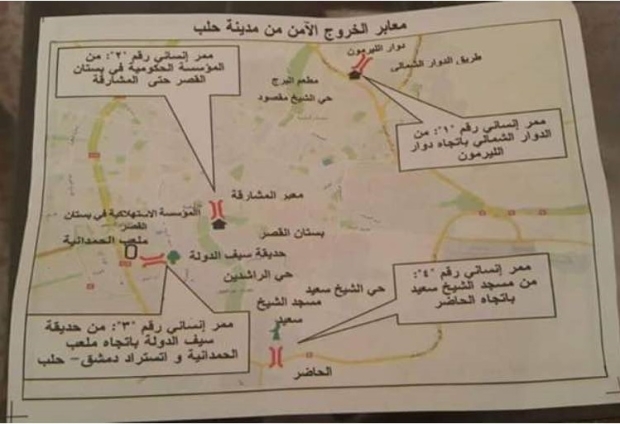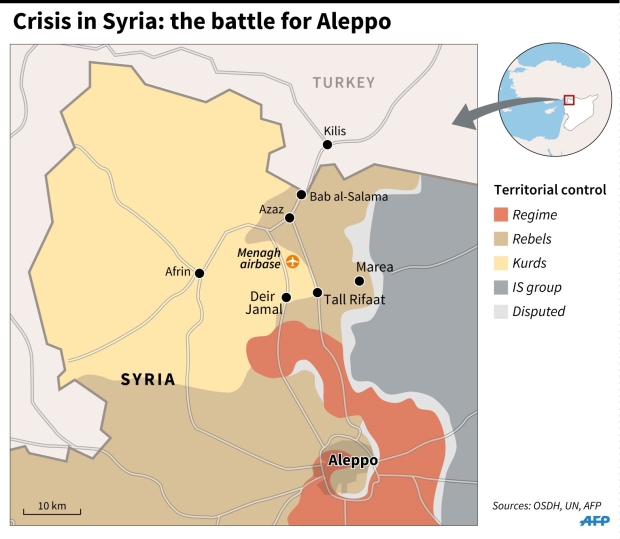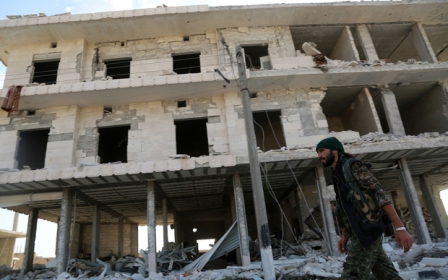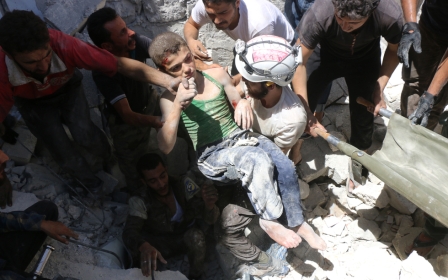Russia says it will open humanitarian corridors around Syria's Aleppo
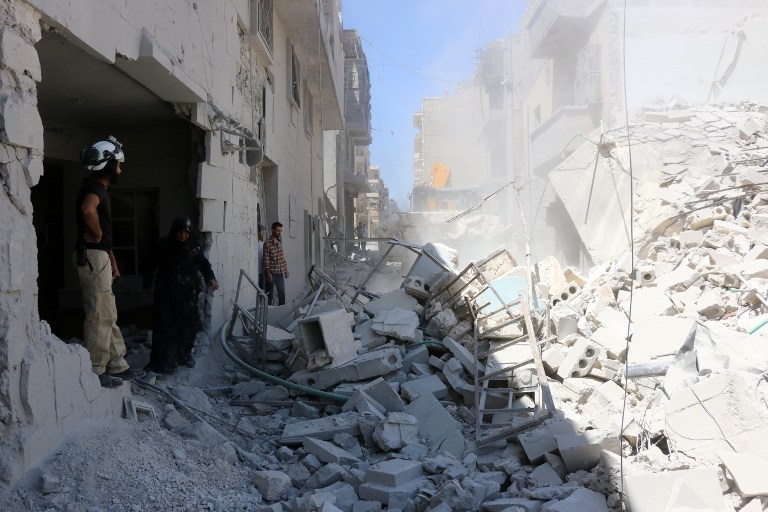
Russia on Thursday said it was launching a "large-scale humanitarian operation" to open humanitarian corridors to allow civilians and fighters to flee the embattled northern city of Aleppo.
Russia's Defence Minister Sergei Shoigu told Russian news agencies that his forces, along with the Syrian government, would open up three humanitarian corridors "to aid civilians held hostage by terrorists and for fighters wishing to lay down their arms".
Syrian President Bashar al-Assad also announced shortly after that they had introduced an amnesty for rebel forces who chose to surrender, the official SANA news agency reported.
He said the call to "everyone carrying arms... and sought by justice... is excluded from full punishment if they hand themselves in and lay down their weapons," SANA said, quoting a presidential decree on the three-month amnesty offer.
However, Zouhir al-Shimale, a Middle East Eye contributor in rebel-held Aleppo, said that the guns had not fallen silent and that there had been no sign as yet of the corridor, despite the government or Russia dropping leaflets overnight telling civilians to leave the city ahead of further anti-rebel advances.
“From this morning until now there have been five air strikes around these areas [where the humanitarian corridor was expected to be],” Shimale said.
“When people tried to cross the Bustan Qasr pass [which connects rebel-held east Aleppo with the government-held west] this morning five shells hit the street around the path, injuring two.”
The head of Aleppo City Council, Haji Hassan, told MEE that reports a humanitarian corridor had been set up were "lies".
"Civilians are being targeted in all locations, especially around hospitals, schools and markets.
"How can the person who has been bombing civilians set up humanitarian corridors for them?"
Many civilians have found themselves wanting to leave but unable to escape due to the fighting.
Abu Omar, a resident in the rebel-held part of Aleppo, told MEE that he was in Bustan Qasr when the explosions went off.
“I just want to live my life and take my kids to safe areas,” he said. “One of my sons has died… but I have two kids left and also my wife. I want to survive.”
Pro-government media outlets have denied the reports, instead claiming that people had not been able to cross through the corridor because Ahrar al-Sham – a rebel group that controls much of Aleppo - was hampering progress at the crossing.
Government advances, however, definitely appear to be continuing in other rebel-held areas, with pro-government forces taking the neighbourhood of Bani Zeid in the northwest outskirts of Aleppo on Thursday.
Bani Zeid has seen heavy fighting in recent days as government forces have moved in on the strategically key area which, according to UK-based monitoring group the Syrian Observatory for Human Rights, has been used to launch rocket attacks into government-held western Aleppo.
“Purging Bani Zeid and Youth Housing regions from the terrorists, the Syrian and resistance forces will now complete the siege on militants in the eastern parts of Aleppo and their supply routes will be fully cut,” Iran’s official Fars news agency reported on Thursday.
Roads to Aleppo, Syria’s biggest city before the war, have largely been cut off since early July when pro-government forces moved in around the Castello road, a lifeline to the rebel-held parts of the city that have been under heavy government and Russian bombing.
Thomas Pierret, a lecturer in contemporary Islam at the University of Edinburgh, told MEE that even if the humanitarian corridor was cleared, he did not expect it to stay open for long.
“You carpet bomb people for a while, then you stop and then you say you are ready to make a humanitarian gesture. They will keep it open for a while, then they will carpet bomb eastern Aleppo,” he said.
The US, he added, was “probably happy” about the corridor because it spared it difficult questions about the siege under way on the rebel side over which the US has been largely silent.
Chris Doyle, director of the Council for Arab-British Understanding (Caabu), told MEE that the promise of a humanitarian corridor "held no weight" as Russia and its allies had proven willing to repeatedly bomb civilians and hospitals.
"They want the complete surrender of Aleppo that has always been their agenda," he said.
Conversely, however, the offer of an amnesty was likely to be genuine, he said, with Assad desperate to retake Aleppo but knowing that he was too weak to retake the city at this stage if all the fighters continued to oppose him.
French Foreign Minister Jean-Marc Ayrault and his British counterpart Boris Johnson on Thursday called for the Syrian government and its allies to end their "disastrous" siege of Aleppo.
The consequences of the siege, "including the bombardment of civilians and medical facilities, are already disastrous and could generate further refugees," the joint statement said.
France's ambassador to the UN, Francois Delattre, has likened Aleppo’s plight to what happened in Sarajevo during the Bosnian war in the 1990s.
“The security council simply cannot accept such war crimes – yes, war crimes – to repeat again.”
UN Syria envoy Staffan de Mistura on Thursday also urged Russia and the US to work together to help stem the fighting in Syria ahead of anticipated peace talks he hopes will take place in August.
Moscow and Washington, while officially supporting opposing sides in Syria, have reportedly been looking to join forces in their fight against the Islamic State group and are due to meet in Geneva soon to discuss details of how to fight militants and reduce violence, de Mistura said.
New MEE newsletter: Jerusalem Dispatch
Sign up to get the latest insights and analysis on Israel-Palestine, alongside Turkey Unpacked and other MEE newsletters
Middle East Eye delivers independent and unrivalled coverage and analysis of the Middle East, North Africa and beyond. To learn more about republishing this content and the associated fees, please fill out this form. More about MEE can be found here.


